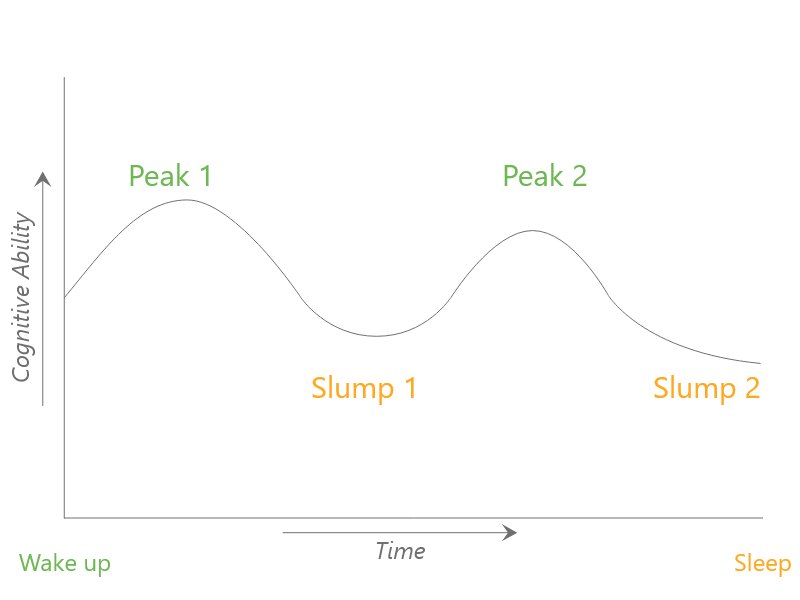Have you ever felt like the God of Focus? No matter what task stood in front of you, there was no stopping. You were at your best! We all experience these windows of hyper-focus, but the rest of the day is a drag. In the worst case, you might even feel as if the whole universe had conspired to make you fall asleep, no matter how serious of a meeting or project you were on.
Don’t worry, it’s a human thing, and we want you to embrace it 😊
Did you know that there is a 2-hour window every day in which doctors are more likely to give a fatal dose of anesthesia to their patients? And in the same 2-hour window, students usually score horribly in tests? This window is 2 PM – 4 PM and author Daniel Pink calls it the “Bermuda Triangle of our Day” in his book When. How do you feel in this period?
Some Light Here Please
The suprachiasmatic nucleus (SCN), a region of your brain connected to the optic nerves, responds to the levels of light. Why? To ensure survival. By responding to light changes from sunrise to sunset, it tunes your circadian rhythm, or “body clock.”
SCN ensures that your body is ready for the three fundamentals of survival at the right time of the day: Eating, sleeping, and mating. Each of these functions requires some preparation in the body, broadly like this:
A cognitive peak to start the day, with high focus and clarity
A slump around mid-day, after 7-8 hours from waking up
A second peak of mental ability after the afternoon slump
The final trough leading to sleep at the end of the day
Throughout these periods your body is changing the levels of chemicals like cortisol, adrenaline, testosterone, and melatonin, so that you can perform better at different tasks. This explains why your urge to sleep is the strongest around 2 AM – 4 AM and 2 PM – 3 PM, especially if you get up by 7 AM every day. Who else feels sleepy in the afternoon? Almost every animal! From your pets to lions in the wild, many animals take a mid-day nap. The primitive monkey within us humans feels the same.
The Wise Rides, the Fool Resists
These waves of rise and fall of cognition are the way evolution has shaped us, and are completely natural. But humans love to mess with nature, right?
Research shows that disruptions in natural rhythm can lead to health issues like obesity, diabetes, depression, and dementia. This seems logical as we saw how the levels of chemicals in the body vary over different times of the day. And there’s only one solution: Ride more, resist less.
You should plan your day in sync with your circadian rhythm. Some of us indeed have no choice, maybe due to a nightshift or living close to the poles where a day or night can be up to six months long. But if you are none of these people, you should drop all the reasons that keep you out of sync with your body clock. And in case your body clock feels broken due to long abuse like staying up till late at night, there is only one piece of advice: Know that it will take time, but the problem will not be solved if you never start. We will solve it together, but let’s look at one small step for now.
Eat the Frog!
Mark Twain once said, “If it's your job to eat a frog, it's best to do it first thing in the morning. And If it's your job to eat two frogs, it's best to eat the biggest one first.”
From Jeff Bezos to Elon Musk, everyone prefers to start their day by eating a frog. Crazy, right?! We want you to do the same. We will explore more benefits in the Kompass soon, but for now, just trust our love for you 😉
Life is full of frogs, and even if you do not like them, you better eat them first thing in the morning, so that you can spend the rest of your day freely, enjoying whatever else you would like to eat. And if it is not clear by now, “frog” here means a hard task.
Just like desserts are kept for the end of the meal, it is better to save your easier activities for later in the day. Tackling your big task first thing in the day has two benefits: First, it helps you enjoy your day better because you are already free from the big task. Second, it matches your big task with your cognitive peak of the morning, boosting your performance further. In fact, there is no downside!

